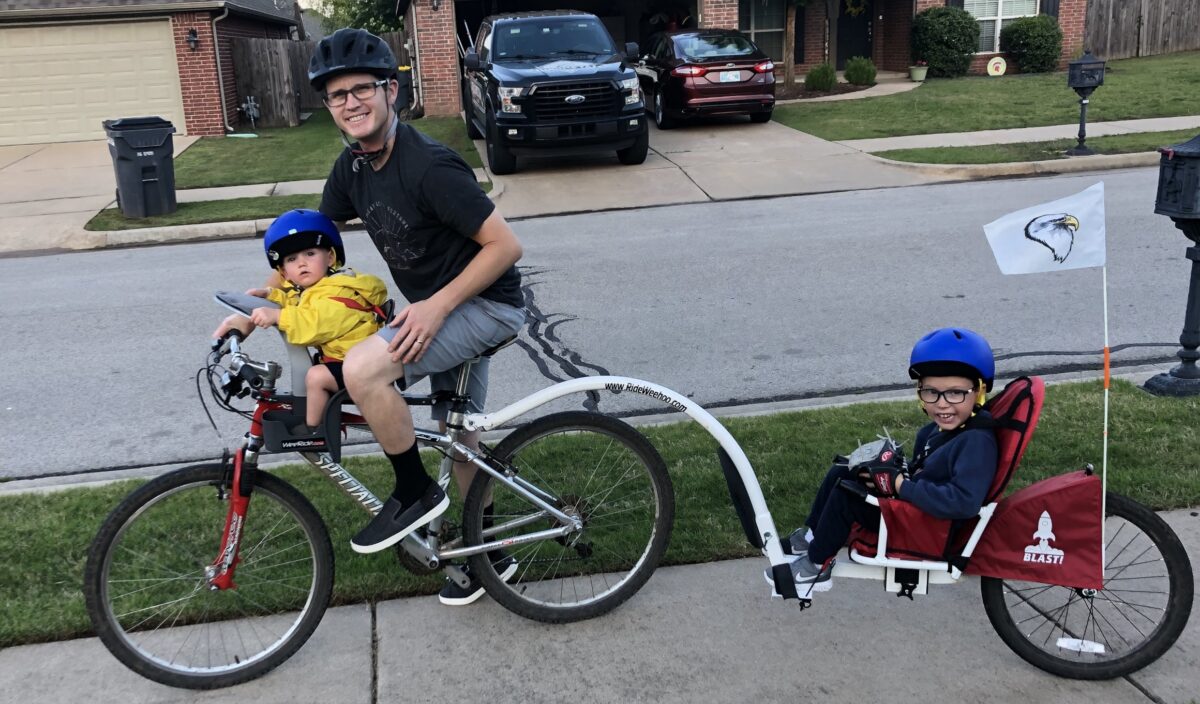
Some people view family biking as an inconvenience, or a sacrifice, or a limiting mode of transportation. But biking can be a valuable source of mobility, freedom, fun, and even convenience. This can be especially true for families with special needs, needs that can be met in unique ways by a bicycle.
After my column last month about using cargo bikes for children with special needs, I was contacted by someone from Texas-based cargo bike company Bunch Bikes. They had many amazing stories to share from their customers and I’m excited to introduce some of them to you — as well as a few other families — in this week’s column.
I hope by doing so, we spread the word to other families who might also love going for a ride, but haven’t yet discovered that — with the right bike set-up — it’s entirely possible.
The photo above came from Cami Barney in Tulsa, Oklahoma. She wrote:
“We always knew we’d be a ‘biking family’, but when our son Calvin was born with a spinal cord injury, our idea of what that looked like changed. We’ve tried different biking arrangements over the years, and have always made it work, and while it’s not perfect, or what we originally imagined, we are definitely still a ‘biking family’.”
Biking can work when driving isn’t possible
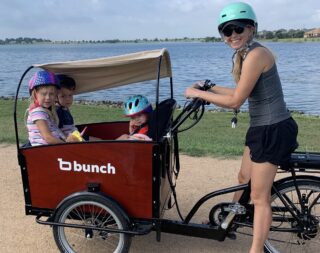
“My name is Amy Patton. I was born with a rare genetic disorder, called Usher Syndrome Type I. This means that I was born profoundly deaf and also have retinitis pigmentosa, and zero balance. Although I received a cochlear implant as a child to assist me with hearing, there is no cure for the retinitis pigmentosa, which essentially is progressive macular degeneration of my eyesight – think tunnel vision due to the dying of the back wall of the eye. This is irreversible and not treatable. Three years ago, at the age of 27, I sat in the eye doctor’s office for my yearly check-up with my husband and the doctor broke the news that I have lost too much vision and I would no longer be able to drive. Although I knew this was inevitable, I never expected it to be this soon. As a mom, all I could think about were the soccer practices and dance recitals, not to mention the school drop offs, grocery shopping, doctor’s appointments and the like that I took for granted all of these years. I’m very independent, and this new development felt like it took away a piece of my identity.
Since that day, my husband and I have been searching for years for something to give me some mobility and freedom again. We stumbled upon cargo bikes and searched and searched for the right one. Our requirements were one that would be a tricycle to give me balance, since I lack natural balance. One that can carry all of our kids (we now have three!). One that has an electric assist because trying to bike with three kids onboard sounds like a nightmare of a workout. And ultimately, something that can give me enough mobility to gain back some of the freedom that I lost. We researched it all, and found Bunch Bikes, which ticked all of those buckets! ….We quickly purchased, and I am SO grateful we did. It has been a game changer!
I am now able to take my kids to any park around town, the lake, doctor’s offices, school, grocery store and the like. Although it doesn’t solve all of the needs, the biggest thing is that it has given me back my sense of self. The Bunch Bike has given me back my life and my freedom and I can be the mom that I have always wanted to be.”
Advertisement
A front-basket cargo bike allows constant monitoring for special needs.
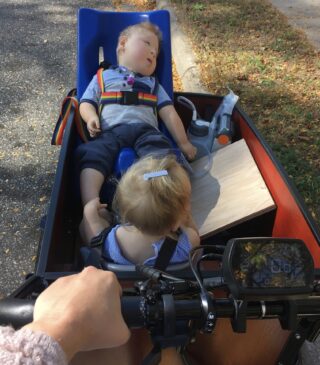
Stephanie Thigpen has four children, including son Garrett whose special medical needs require constant supervision.
“Garrett (our son) is a little medical miracle. He spent the first 5 months of his life at the Mayo clinic ICU. When he finally came home it was with a trach (hole in his neck for breathing) breathing machine, g tube (hole in his stomach for machine feeding and hydration) And a whole lot of other complications! He is very stable now, but….Garrett’s needs require adult supervision at all times: it takes two adults to drive with him in a car. This makes driving quite the to do. Frequently, there is only one parent available, so [the bike] opens up all kinds of possibilities for us; we are thrilled about it! The bike allows me (his mother) to ride around town with him solo (or with any of his 3 siblings) and I can safely tote him and his equipment and it is truly transformative.”
A cargo bike with e-assist can even carry carry larger passengers, medical equipment, comfort items, and even additional family members, without fatiguing the pedaler.
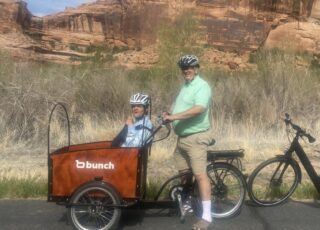
It’s not just about cargo bikes for the Rowley Family
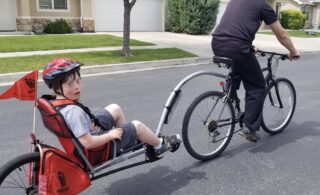
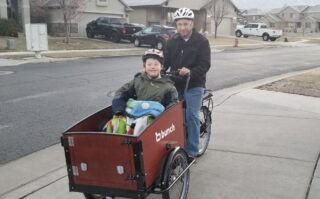
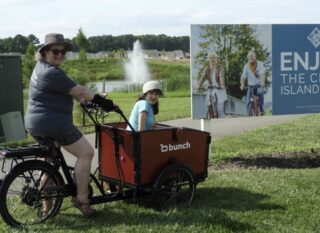
“This really seems to be a problem for special needs families—when their child gets big, it is hard to find a way to involve them in some family activities… When Wendy was younger, we had a Burley Encore that we would use when biking as a family. Now that she is 12, she is too tall to fit in the Burley and…she is getting heavy to have in a bike trailer on hills! We weren’t sure how we were going to be able to continue biking as a family.
We saw a Facebook post from a special needs family in Virginia that had a Bunch bike and it looked like it was the answer!It can handle 350 pounds total. There is plenty of room in the cargo box for Wendy, the bag of medical supplies that always travels with us, comfy blankets, snacks, toys, etc. Sometimes I even ride both her and her sister in the cargo box, which they think is pretty hilarious….The cargo box has plenty of room for purchases at festivals or our local farm store. Most of all, the Bunch bike lets us bike as a family again.”
Thank you to all of the families who shared their photos and stories. I hope all families are able to find biking accommodations to meet their special needs, and to share solutions with those who are still searching. Happy biking everyone!
— Shannon Johnson, shannon4bikeportland@gmail.com
— Get our headlines delivered to your inbox.
— Support this independent community media outlet with a one-time contribution or monthly subscription.



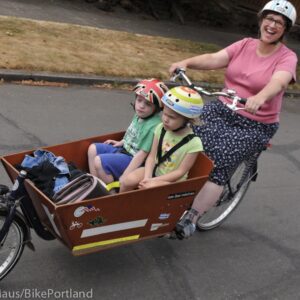


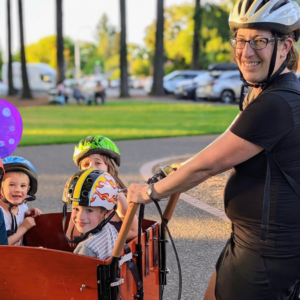
Thanks for reading.
BikePortland has served this community with independent community journalism since 2005. We rely on subscriptions from readers like you to survive. Your financial support is vital in keeping this valuable resource alive and well.
Please subscribe today to strengthen and expand our work.
This is a great story Shannon. It is a good reminder of how many people can’t drive—children, elderly, disabled—and why it is inequitable not to have safe alternatives available.
This is great.
A note of caution, however – trikes with a front king pin for steering need to be ridden rather slowly as they are much less stable than trikes with turning front wheels. The first trikes I ever rode in NYC were Worksmans of this design, and I was tasked with delivering newspaper bundles in Lower Manhattan – often 300 lbs. worth. Without getting into design details, by having to rotate the entire front section for steering, the front wheels move closer to the centerline as you turn thus decreasing stability. You also have to rotate the weight of the entire front section and it’s contents to engage every turn.
The Bunch website shows that all of their models are the front king pin design. In fact, it looks like the same chassis with different structures mounted.
Again, this is all fine if you’re cruising slowly, but I think it’s important that parents understand that these trikes can get away from you pretty quickly – especially with relatively heavy loads, and navigating uneven terrain that may include driveways and curb cuts.
I do hope that the electric assist on these are about power and not speed.
I suppose the takeaway here is do some test riding first.
I mention Bunch because you mention them … numerous times.
YMMV
Good points. I see riders with electric assist all over Bend, and some of them are flying. 25-30 mph on flat ground. Handling a bike at 15 mph is a totally different challenge than going 30, and I fear that many of these new speedsters are going to end up crash landing. Add to that risk is drivers ‘expect’ bikes to be going 15 mph and are shocked when the rider is ‘right there’. Trust me, I know this because I am pretty fast, and drivers are constantly misjudging my speed.
Aaron, owner @ Bunch Bikes, here.
We equip all new customers with a getting started video with safety tips for riding, in addition to the user manual and emails post-purchase with advice and information for using their new bike.
We are very aware here of the pros/cons of this style of trike, and we advise customers of this.
And yes, the electric assist is more about power than speed. It’s very useful for effortlessly moving kids/dogs/gear, or riding up moderate hills. The top speed and gearing on our bikes is limited to what can be safely ridden. Safety is #1.
We do encourage customers to take test rides if they are uncertain about our bikes. There are 50 ambassadors around the country and counting that are making this possible in more and more cities.